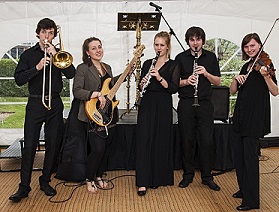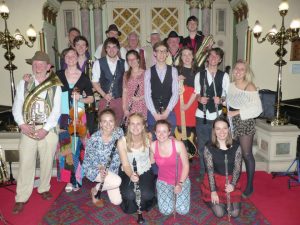Collaborations
Jewish Music Institute
JMI – Where Jewish Music Lives
JMI is the home of Jewish music in the UK. They are based at SOAS at the University of London and are dedicated to the celebration, preservation and development of the living heritage of Jewish music for the benefit of people of all ages and backgrounds. Their goal is to inform and inspire audiences with an exciting, original programme of live performances, educational events and collaborative projects and to support musicians playing Jewish music across the UK enabling them to preserve this traditional heritage, create new work and reach the widest audiences.
Drawing Life: The Jewish Music Institute’s commission, Drawing Life, a multi-media composition about children in Terezin by Jocelyn Pook. Drawing Life is a dramatised song cycle with film and video, based on the book I Never Saw Another Butterfly. Featuring poems and drawings by Jewish children imprisoned in Terezin, Pook draws inspiration from the children’s creative spirit. The commission marks the 70th anniversary of the start of the disintegration of the Terezin concentration camp in 1944 and the thirtieth year of the Jewish Music Institute. It has now received substantial Arts Council England funding tour the UK in January 2016 and more details can be found here: https://www.jmi.org.uk/drawinglife/
Summer Schools and events: JMI runs a series of Annual Summer Schools in Yiddish (Ot Azoy), Yiddish Song (Golden Peacock) and Klezmer (Klezfest) all details of these can be found at https://www.jmi.org.uk/events
SOAS, Education programmes, Lectures and Master classes:
JMI and SOAS co-fund the post of the Joe Loss Lecturer in Jewish Music, in memory of the great British Jewish Band Leader Joe Loss. The post is currently held by Dr Ilana Webster-Kogen. https://www.soas.ac.uk/staff/staff71509.php
Other aspects of the work at SOAS and JMI involvement in the academia can be found here:https://www.jmi.org.uk/learning-development/undergraduate-postgraduate-courses
And the schools programs here: https://www.jmi.org.uk/learning-development/schools-programme/
Newsletter: JMI produces a monthly Newsletter which informs the public about all its projects, Jewish music in the UK at large and forthcoming events both in London and across the UK. This can be subscribed to, for free, from any page on the JMI website here: https://www.jmi.org.uk
Podcasts: JMI produces podcasts on events it produces as well as to highlight, educate and inform others abput the people and the history of Jewish Music: they can be found here: https://www.jmi.org.uk/radio/ and here:https://www.mixcloud.com/jewishmusicinstitute/
Manchester Podcast: JMI interview Richard Fay, Ros Hawley, the L’chaim Kapelye and Max Dunbar of the Jewish Museum and that can found here: https://www.mixcloud.com/jewishmusicinstitute/manchester-klezmer/
Manchester Jewish Museum
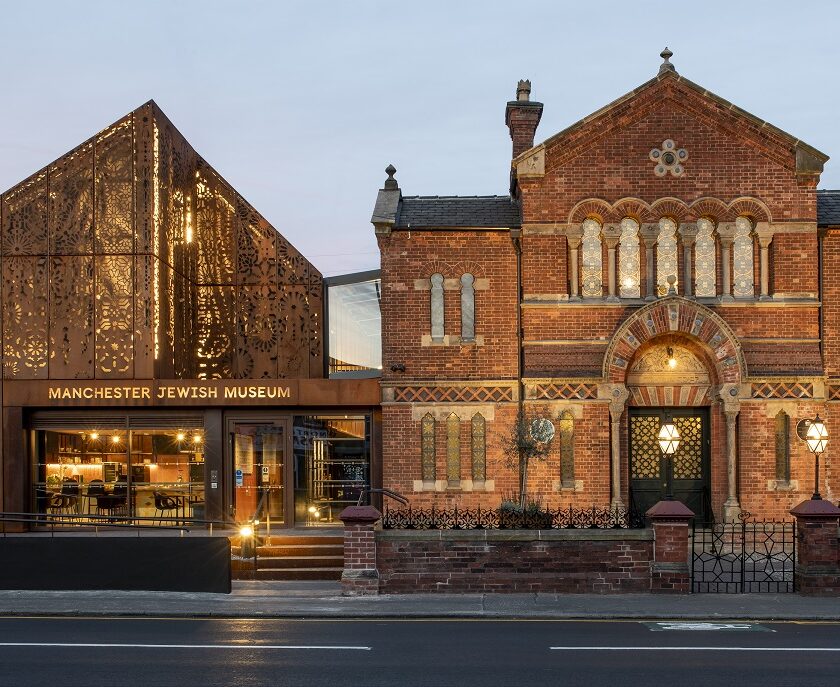
The Manchester Jewish Museum (MJM) is for Jewish and non-Jewish people offering a unique experience as both a social history museum and as a resource for learning. As a social history museum we tell the story of Manchester’s Jewish community from the 1780s to present day.
With 30,000 items in our collections, MJM explores the cultural and religious evolution of Manchester’s Jewish community – the largest Jewish community in the UK (outside London). Our galleries reveal the political and industrial legacies of this community on a local, regional, national and international scale.
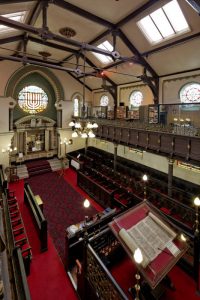 This is the only UK museum housed inside an original synagogue and, built in 1874, it is Manchester’s oldest surviving synagogue building. The building provides a unique and powerful learning space for all ages. From schoolchildren to adult learners, MJM helps over 15,000 people a year discover, explore and celebrate Jewish faith and culture.
This is the only UK museum housed inside an original synagogue and, built in 1874, it is Manchester’s oldest surviving synagogue building. The building provides a unique and powerful learning space for all ages. From schoolchildren to adult learners, MJM helps over 15,000 people a year discover, explore and celebrate Jewish faith and culture.
Through its spectacular Grade II* listed building and through its displays, exhibitions and events programme MJM offers an experience that will inspire, inform and educate everyone.
The collaboration between Museum and the Michael Kahan Kapelye and related klezmer developments in the Music Department at Manchester dates back to December 2012 when the museum hosted the first of what have become a regular series of klezmer concerts there.
MJM – MKK (University) Collaboration:
The collaboration between Museum and the Michael Kahan Kapelye and related klezmer developments in the Music Department at Manchester dates back to December 2012 when the museum hosted the first of what have become a regular series of klezmer concerts there.
- L’chaim Kapelye open the Marc Chagall Exhibition (June 2013)
- Gathering of the Klezmorim at the Museum
These have taken place for Chanukah each year (2012, 2013, 2014 …. 2015) and there have also been similar events in most summers. Additionally, the university-based klezmorim in various ensembles and smaller groups have performed for some of the Museum’s including the [exhibition opening; 5 museum event]
Heathlands care home
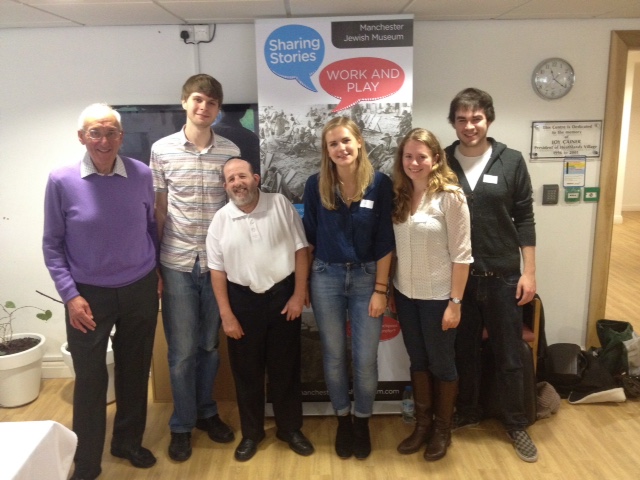
(ex-MKK) Klezmorim at Heathlands
Ellie Sherwood writes: “Heathlands Village is a care home in Prestwich, Manchester that accommodates the religious and cultural needs of people of the Jewish faith; however, they also accept residents of other faiths or no faith. Various musicians from the 2012/13 and 2013/14 cohort of students in the Michael Kahan Kapelye have been visiting Heathlands for the past two years, and have performed in several of the evening reminiscence sessions that take place at the care home. These reminiscence sessions are led by Charles Bloom, a volunteer at the Manchester Jewish Museum, who has a lot of experience of leading performances that allow older people to remember past events such as weddings and Bar and Bat Mitzvahs. The live music provided by the klezmer musicians enhances the reminiscence sessions, as residents at the care home are reminded of popular tunes that would have been played at the celebrations they regularly attended throughout their lifetime. The atmosphere of the sessions are always lively and positive, and many of the residents often get up to dance during the live performance.
With an increasing amount of research showing the positive influence of music on individuals with Alzheimer’s disease, these klezmer performances at Heathlands are a significant and important part of the klezmer activity in Manchester. The live music enables residents to experience their past in a creative and positive way, and the fun and enjoyment of listening and dancing to klezmer music is shared by all who attend the reminiscence sessions.”
Lucie Phillips adds: “Giving it back is important not only as a sign of gratitude to those who have inspired us in life but because music is an integral part of community and health that sometimes gets forgotten later in life in healthcare settings. By playing the appropriate music in, for example, dementia care homes music can:
- help rid the confusion of this disease from someone, if only for a few minutes or seconds; music can stimulate the brain so that Alzheimer’s sufferers can remember again for a short while after;
- fill a void with enjoyment and companionship;
- be the only thing that still makes sense.
While science is still trying to find out why, the evidence clearly presents itself in real living people. Where there is so much isolation for dementia patients, music can cultivate community and collectivity through sharing music sessions and concerts. This doesn’t just animate residents, but brings such joy to staff and family members too, which renders the act of giving it back, through music in this case, evermore significant. We know music cannot cure alone but it certainly helps keep the soul living until the very end.”

